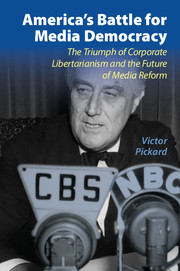 America's Battle for Media Democracy
America's Battle for Media Democracy Book contents
- Frontmatter
- Contents
- Acknowledgments
- Introduction
- 1 The Revolt against Radio
- 2 A Progressive Turn at the FCC
- 3 The Battle of the Blue Book
- 4 The Origins of the Fairness Doctrine
- 5 The 1940s Newspaper Crisis and the Birth of the Hutchins Commission
- 6 Should the Giants Be Slain or Persuaded to Be Good?
- 7 The Postwar Settlement for American Media
- Conclusion
- Bibliography of Primary Sources
- Index
- References
Introduction
The Policy Origins and Normative Foundations of American Media
Published online by Cambridge University Press: 05 October 2014
- Frontmatter
- Contents
- Acknowledgments
- Introduction
- 1 The Revolt against Radio
- 2 A Progressive Turn at the FCC
- 3 The Battle of the Blue Book
- 4 The Origins of the Fairness Doctrine
- 5 The 1940s Newspaper Crisis and the Birth of the Hutchins Commission
- 6 Should the Giants Be Slain or Persuaded to Be Good?
- 7 The Postwar Settlement for American Media
- Conclusion
- Bibliography of Primary Sources
- Index
- References
Summary
To live in modern society today is to be immersed in media. We spend much of our waking lives reading, viewing, listening to, and interacting with the products and processes that we refer to generally as “media” or a “media system.” Yet most of us know little about the policies that structure the media surrounding us. Particularly in the United States vast sectors of communications are heavily commercialized, dominated by corporate duopolies and oligopolies, with relatively little public input or oversight. How did Americans come to inherit this particular media system? More specifically, when and how did the U.S. polity determine media’s normative role in a democratic society – its social responsibilities and commitments to the public interest? Everyone learns in school that an independent press is necessary for democratic self-governance, but American citizens rarely pause to reflect on what this means. How did American society decide upon media’s public service obligations? Commercial media institutions receive many benefits, from indirect subsidies and tax breaks to monopolistic use of the public airwaves; what do they owe society in return?
This book shows that many of these answers lie in the 1940s, when core constituencies fought over questions about the American media system’s governance and design. The following historical analysis retraces policy trajectories, ideas, and discourses to a moment before received assumptions about media’s role in society took on an air of inevitability. By uncovering a key chapter of this history, this project is as much about the present and future as it is about the past. Once we realize that the status quo was contingent, that there were other options, other roads not taken, we can begin to imagine that a very different media system was – and still is – possible.
- Type
- Chapter
- Information
- America's Battle for Media DemocracyThe Triumph of Corporate Libertarianism and the Future of Media Reform, pp. 1 - 8Publisher: Cambridge University PressPrint publication year: 2014


